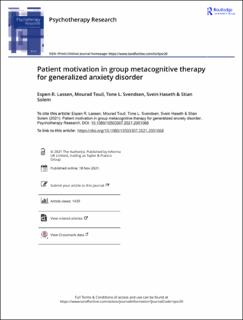| dc.contributor.author | Lassen, Espen Rasmussen | |
| dc.contributor.author | Touil, Mourad | |
| dc.contributor.author | Svendsen, Tone Louise | |
| dc.contributor.author | Haseth, Svein | |
| dc.contributor.author | Solem, Stian | |
| dc.date.accessioned | 2022-04-19T06:32:22Z | |
| dc.date.available | 2022-04-19T06:32:22Z | |
| dc.date.created | 2021-12-02T16:37:01Z | |
| dc.date.issued | 2021 | |
| dc.identifier.issn | 1050-3307 | |
| dc.identifier.uri | https://hdl.handle.net/11250/2991204 | |
| dc.description.abstract | OBJECTIVE: The aim of this study was to investigate the predictive value of motivational language (change talk [CT] and sustain talk [ST]) on treatment outcome of group metacognitive therapy (g-MCT) for generalized anxiety disorder (GAD). METHOD: Video recordings of the first, fourth, and seventh therapy sessions (55 patients) were encoded using the Motivational Interviewing Skill Code (MISC) manual. The strength of the patients’ motivational utterances was encoded as CT or ST with seven subcategories. RESULTS: The strength of CT-utterances and ST-utterances differed significantly between treatment responders and non-responders as therapy progressed. The strength of ST-utterances increased significantly more among non-responders than responders, whereas CT and positive taking steps utterances increased more among treatment responders than non-responders. CT and ST in session 1 were not associated with treatment outcome. CT and ST in sessions 4 and 7 significantly predicted lower and higher worry-scores at post-treatment, respectively. This effect was particularly evident for taking steps utterances in session 7. CONCLUSION: These findings confirm the predictive value of MISC in sessions 4 and 7 of g-MCT for GAD and highlight the importance of therapists addressing patient motivation. | en_US |
| dc.language.iso | eng | en_US |
| dc.publisher | Routledge | en_US |
| dc.rights | Navngivelse 4.0 Internasjonal | * |
| dc.rights.uri | http://creativecommons.org/licenses/by/4.0/deed.no | * |
| dc.title | Patient motivation in group metacognitive therapy for generalized anxiety disorder | en_US |
| dc.type | Peer reviewed | en_US |
| dc.type | Journal article | en_US |
| dc.description.version | publishedVersion | en_US |
| dc.source.journal | Psychotherapy Research | en_US |
| dc.identifier.doi | 10.1080/10503307.2021.2001068 | |
| dc.identifier.cristin | 1963755 | |
| cristin.ispublished | true | |
| cristin.fulltext | original | |
| cristin.qualitycode | 2 | |

